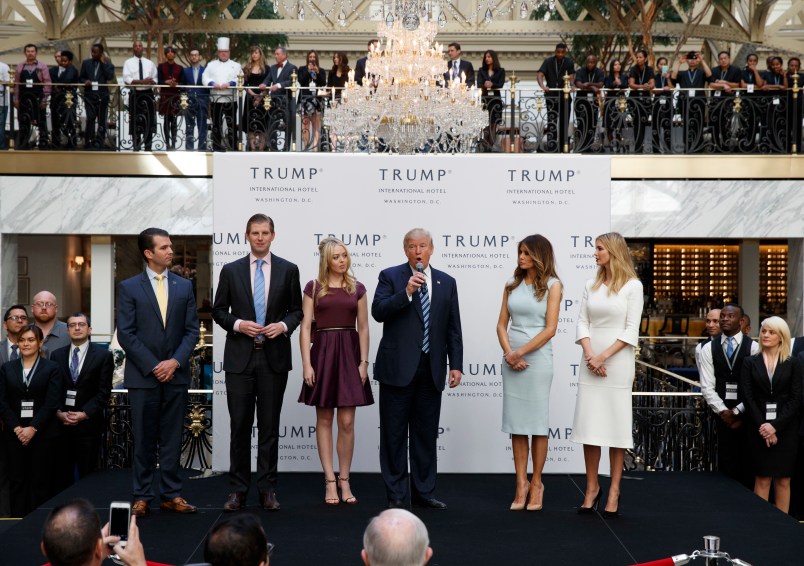President Trump cannot fast track his appeal to stop evidence-gathering in an emoluments case because “the President is neither above the law nor exempt from litigation,” the attorneys general for Maryland and D.C. argued in a Feb. 6 appellate brief.
Calling Trump’s bid to halt discovery in the emoluments case “a drastic end-run around the appellate process,” the state attorneys general contended in a brief to the Fourth Circuit Court of Appeals that the president cannot short-circuit the normal appeal process to avoid discovery.
“President Trump has chosen to maintain ownership of his private business empire while holding the Nation’s highest public office,” the state attorneys wrote, adding that the decision raises the question of “whether the Emoluments Clauses permit an officeholder to accept payments or other benefits from foreign and domestic governments during his tenure.”
The brief goes on to state: “‘Proceeding to discovery ‘in the service of answering that question— with the balance of discovery tracing payments from third parties to the President’s ownership stake in the Trump Organization—does not” warrant the appeals court’s “immediate intervention and does nothing to ‘threaten the separation of powers.'”
DOJ attorneys filed the emergency appeal – seeking a writ of mandamus – in December. The move came after a lower court judge allowed discovery to proceed in the case.
The state attorneys general sued Trump last year, arguing that he is violating the emoluments clause of the Constitution by accepting money through his hotels from foreign officials.
The state attorneys general emphasized throughout the brief what they see as the “extraordinary” nature of the president’s early appeal.
“The President has no basis in law for his assertion that he is ‘immun[e] from judicial process,'” they wrote. They called the DOJ’s move “an extreme step” and wrote that Trump’s “novel reading” of the Constitution “would allow foreign and domestic officials to confer payments or benefits of any scope to the President in his “private” capacity, or by remitting them to him through his businesses.”
The brief cited previous presidents and government agencies as relying on the Justice Department’s Office of Legal Counsel to handle emoluments-related issues.
Conspicuously, the attorneys cited a 1993 memo written by then-OLC staffer and current Supreme Court Justice Samuel Alito, Jr. as saying that the emoluments clause covers “any profits” accepted from a domestic or foreign government. Some observers anticipate the Supreme Court to eventually rule on Trump’s emoluments issues.
The attorneys general also cite a recent inspector general’s report on the General Services Administration’s decision to not conduct research on whether the agency’s lease of the Old Post Office building in DC to the Trump Organization raised emoluments concerns.
“The same is true with respect to the GSA’s decision to forgive a clear breach of the Old Post Office building’s lease, thus allowing the Hotel to continue in operation,” attorneys write in the brief. “That concession could only arise from the President’s position as President.”







Did I say “any profits”? I meant to say “any profits accompanied by a duly-notarized contract specifying a quid pro quo.”
Clowns to the left, jokers to the right.
“Conspicuously, the attorneys cited a 1993 memo written by then-OLC staffer and current Supreme Court Justice Samuel Alito, Jr. as saying that the emoluments clause covers “any profits” accepted from a domestic or foreign government. Some observers anticipate the Supreme Court to eventually rule on Trump’s emoluments issues.”
This observer anticipates that Alito will prove as arbitrary, capricious, intellectually dishonest and self-contradictory as Scalia just to protect Trump.
Alito will invoke that well-respected hoary legal maxim, “that was then, this is now”.
“President Is Not Above Law!”
He is if he’s a GOPer. IOKIYAR. It’s partly why the GOP spends so much time manufacturing bullshit about Dem POTUSes and then bemoaning that the Dem POTUSes are lawless and treated as above the law. They then turn around and use it to feel justified doing whatever the fuck they want while POTUS and literally, blatantly abousing congressional power to protect their POTUSes from oversight.